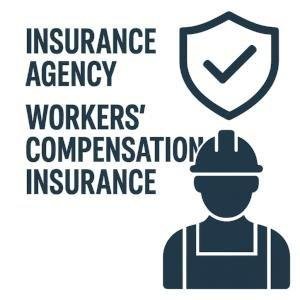
Coverage Options for GA Recruitment Agency Workers’ Comp
September 8, 2025
Workers Comp Seminar: What Your Leadership Team Must Know
September 8, 2025In today’s competitive staffing industry, managing operational costs while ensuring comprehensive employee protection is crucial. one notable expense for staffing firms is workers’ compensation insurance, an essential safeguard that provides coverage for work-related injuries and illnesses. Finding affordable workers’ comp insurance without compromising on coverage quality can be a complex challenge. This guide aims to help staffing companies navigate teh intricacies of workers’ compensation insurance, offering strategic insights and practical tips to secure cost-effective policies tailored to their unique workforce needs. By optimizing workers’ comp insurance expenditures, staffing firms can enhance financial stability and maintain compliance while prioritizing employee safety and well-being.
Table of Contents
- Understanding Workers’ Compensation Insurance for Staffing Firms
- Key Factors Influencing Insurance costs in the Staffing Industry
- Strategies for Securing Affordable Workers’ Compensation Coverage
- Best Practices for Maintaining Compliance and Reducing Premiums
- Q&A
- Insights and Conclusions
Understanding workers’ Compensation Insurance for Staffing Firms
Staffing firms operate in a unique landscape where the risk exposures vary significantly across different industries and job functions. workers’ compensation insurance is designed to protect both the staffing agency and the employees by covering medical expenses and lost wages resulting from workplace injuries or illnesses.For staffing firms, this coverage is particularly important due to the temporary and often diverse nature of the workforce, which can complicate liability and claims management. Insurers assess the risk based on the types of roles filled, the duration of assignments, and the safety protocols in place, making a tailored policy essential for cost-effective protection.
Understanding the core components of workers’ comp for staffing helps firms better manage premiums and reduce risks. Key elements include:
- Classification Codes: These are industry-specific codes assigned to different job types which directly influence premium rates.
- Payroll Reporting: Accurate payroll tracking for placed workers is critical as premiums are calculated based on reported wages.
- Claims History: A clean claims record signals lower risk to insurers,often resulting in more competitive rates.
- risk Management Practices: Implementation of safety training and ergonomic assessments reduces the frequency and severity of claims.
Below is a simplified overview of how classification codes impact premium calculation for typical staffing sectors:
| Sector | Classification Code | Estimated Rate per $100 Payroll |
|---|---|---|
| Office & Clerical | 8810 | $0.15 – $0.30 |
| Light Industrial | 8742 | $1.50 – $3.00 |
| Healthcare Staffing | 8832 | $2.00 - $5.00 |
| Construction | 5645 | $4.00 – $9.00 |
Key Factors Influencing Insurance costs in the Staffing Industry
Calculating insurance expenses for staffing firms involves a variety of variables that directly impact premium rates. Among the most significant is the nature of assignments your workers undertake; roles involving higher physical risks, such as construction or warehouse positions, generally attract increased premiums. Another crucial factor is your company’s claim history-frequent past claims signal a higher risk to insurers, leading to steeper costs. Additionally, the overall payroll size plays an essential role since premiums are often percentage-based on total wages. Insurers also consider your firm’s safety protocols and employee training programs. Companies with robust safety measures and ongoing risk management tend to receive more competitive rates.
Understanding these influences can help you strategize effectively to manage and possibly reduce expenses. For example, investing in regular training can lower workplace injuries and consequently, your claim frequency. The geographic location of your operations can also affect rates, as workers’ comp insurance premiums differ by state due to regional regulatory frameworks. Lastly, policy selection-including deductible options and coverage limits-provides versatility in balancing cost and risk coverage. The table below summarizes key elements that impact insurance premiums for staffing agencies:
| Factor | Impact on Costs | Mitigation Strategy |
|---|---|---|
| Type of Job assignments | Higher risk jobs increase premiums | Focus on low-risk staffing niches |
| Claims History | Frequent claims raise costs | Implement safety and wellness programs |
| Payroll Size | Premiums scale with wages | Monitor and optimize payroll allocations |
| Location | State laws affect rates variably | Consider multi-state policy review |
Strategies for Securing Affordable Workers’ Compensation Coverage
To optimize the cost of workers’ compensation insurance, staffing firms should begin with a comprehensive risk assessment. Understanding the specific hazards associated with different job roles allows for targeted safety training and preventive measures, ultimately reducing claim frequency. Regularly updating workplace safety protocols and investing in employee well-being programs not only enhance safety but also improve your risk profile, which insurers reward with lower premiums. Additionally, leveraging technology such as safety management software helps track incidents and enforce compliance efficiently.
Another effective approach includes exploring insurance provider options and customizing policy elements to fit your unique operational needs. Consider the following strategies:
- Negotiating deductibles and coverage limits aligned with your risk tolerance.
- Bundling workers’ comp with other business insurance policies to access multi-policy discounts.
- Utilizing retrospective rating plans that offer premium refunds for low claim experiences.
- Partnering with brokers who specialize in staffing firms for better policy terms and guidance.
| Strategy | Benefit | Impact on Premiums |
|---|---|---|
| Risk Assessment & Safety Programs | Lower claim frequency and severity | Significant reduction |
| Customized Policy Limits | Better coverage control | Moderate reduction |
| Multi-Policy Discount bundling | Cost savings across policies | Moderate reduction |
| Retrospective Rating Plans | Refund on favorable claims history | Variable but potentially high |
Best Practices for maintaining Compliance and Reducing Premiums
To effectively manage workers’ compensation costs, it’s crucial to implement a proactive safety program tailored to the specific risks associated with staffing firms. Emphasizing employee training, regular workplace audits, and swift injury reporting can dramatically reduce incidents that lead to claims. Maintain clear documentation of all safety procedures and injury reports, as this clarity not only supports compliance but also plays a vital role during audits or claim disputes. Additionally, partnering with a dedicated risk management consultant can provide up-to-date insights on regulatory changes and customized solutions for your firm’s unique risk profile.
Key strategies to lower premiums and stay compliant include:
- Implement comprehensive safety training programs for all temporary and permanent staff
- Perform monthly safety inspections and promptly address identified hazards
- Encourage early injury reporting and facilitate timely return-to-work programs
- Leverage classification codes accurately to avoid overpaying premiums
- Engage with insurance carriers regularly to review and adjust policies based on loss history
| Best Practice | Benefit | Impact on Premiums |
|---|---|---|
| Regular Safety Audits | Identifies risks before incidents occur | Lower claims, reduced rates |
| Accurate Employee Classification | Ensures proper premium calculation | Prevents overcharges |
| Early Injury Reporting | Facilitates faster claims resolution | Minimizes claim costs |
Q&A
Q&A: Cheap Workers’ Comp Insurance – Staffing Firm Guide
Q1: What is workers’ compensation insurance, and why is it important for staffing firms?
A1: Workers’ compensation insurance provides coverage for medical expenses, lost wages, and rehabilitation costs when an employee is injured on the job. For staffing firms, it is critical as it protects both the business and its placed employees from financial liabilities arising from workplace injuries, ensuring compliance with state laws and maintaining client trust.
Q2: How can staffing firms find affordable workers’ comp insurance without compromising quality?
A2: Staffing firms can secure affordable workers’ comp insurance by shopping around among multiple insurers, leveraging group policies or industry-specific programs, maintaining accurate payroll reporting, implementing strong safety protocols, and working with brokers who specialize in staffing industry risks. These strategies help balance cost with comprehensive coverage.
Q3: What factors most influence workers’ compensation insurance premiums for staffing firms?
A3: Premiums are influenced by the firm’s payroll size, the job classifications of placed employees, historical claim experiance, state-specific regulations, and the safety record of both the staffing firm and its clients. High-risk placements or claims history typically result in higher premiums.
Q4: Can staffing firms reduce their workers’ comp costs through risk management?
A4: Absolutely.Implementing rigorous safety training, conducting thorough client site evaluations, promoting early injury reporting and return-to-work programs, and fostering an injury prevention culture can lower the frequency and severity of claims, thus reducing overall insurance costs.
Q5: Are there alternative insurance options or funding methods for staffing firms seeking cheaper workers’ comp coverage?
A5: Yes. Some firms explore deductible programs, self-insurance or captives, and pooled insurance arrangements tailored for the staffing sector. However, these options require careful financial analysis and compliance review to ensure they are viable and reduce long-term costs effectively.
Q6: How can staffing firms ensure compliance with workers’ comp laws while seeking cost savings?
A6: Firms should stay informed about state-specific workers’ compensation requirements, maintain accurate employee classification, and ensure timely premium payments. Partnering with educated insurance brokers and legal counsel helps ensure compliance without sacrificing cost-efficiency.
Q7: What role does accurate payroll classification play in managing workers’ comp insurance costs?
A7: Accurate payroll classification ensures that employees are categorized correctly according to the risk associated with their job duties. Misclassification can lead to overpayment or underpayment of premiums and potential audits or penalties, making it a key factor in cost management.
Q8: How often should staffing firms review their workers’ comp policies to optimize cost and coverage?
A8: Firms should review their workers’ compensation insurance annually or whenever significant changes occur, such as shifts in payroll, job classifications, or claims history. Regular reviews allow for renegotiation, adjustment of coverage limits, and request of new cost-saving measures.
Insights and Conclusions
securing affordable workers’ compensation insurance is a critical component in managing staffing firm operations efficiently while maintaining compliance and protecting both employees and the business. By carefully assessing your firm’s unique risk profile, exploring multiple insurance providers, and implementing strong safety protocols, you can significantly reduce premiums without sacrificing coverage quality. Staying informed and proactive in your insurance strategy not only controls costs but also reinforces your commitment to workforce well-being-an essential factor for long-term success in the competitive staffing industry.
“This content was generated with the assistance of artificial intelligence. While we strive for accuracy, AI-generated content may not always reflect the most current information or professional advice. Users are encouraged to independently verify critical information and, where appropriate, consult with qualified professionals, lawyers, state statutes and regulations & NCCI rules & manuals before making decisions based on this content.








